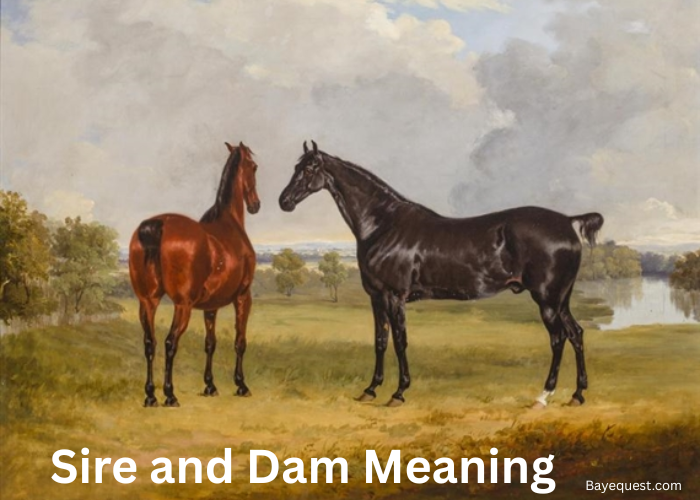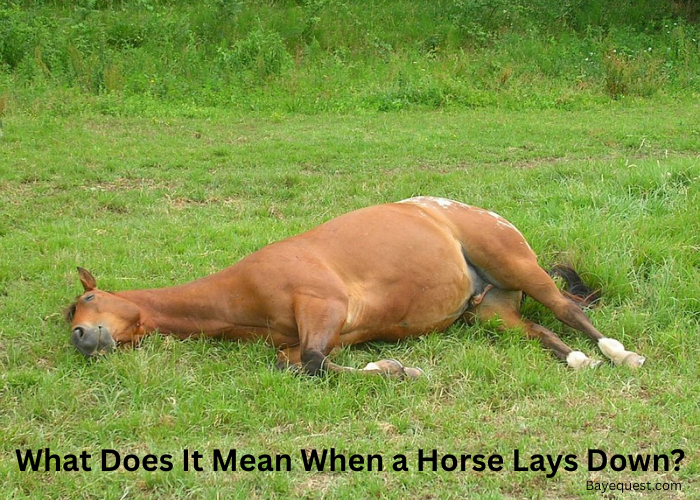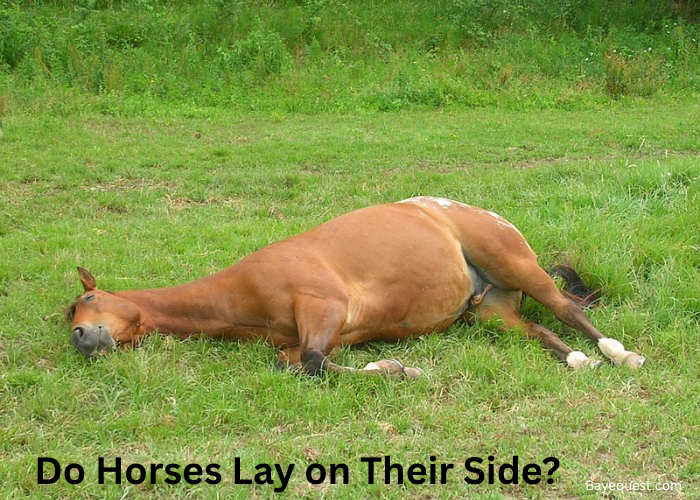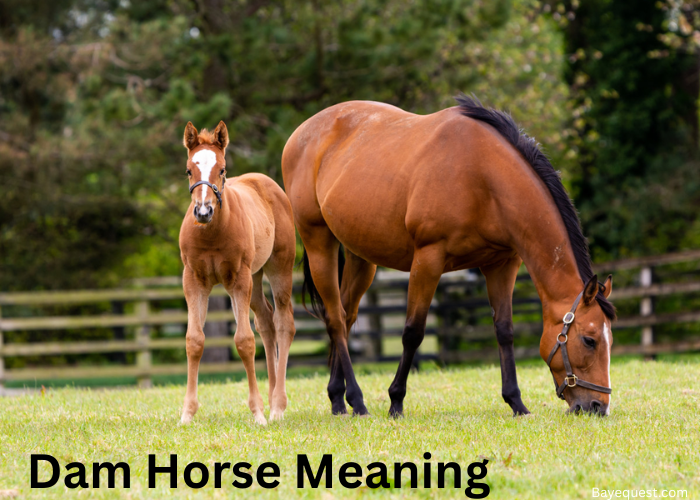Every horse carries the story of two parents: a sire and a dam. Knowing who your horse’s sire and dam are can tell you a lot.
In this guide, you’ll learn what “sire” and “dam” really mean. You’ll also find out how they shape a foal’s traits, and why understanding lineage matters for owners and breeders alike.
By the end, you’ll see that every horse is not just an individual but also the living legacy of its parents.
Sire and Dam Meaning in Horse Breeding: Key Takeaway
In horse breeding, the sire is the father and the dam is the mother of a horse. Together, they shape every aspect of their foal, from its body structure to its athletic ability. Understanding a horse’s sire and dam helps owners predict traits, assess potential, and appreciate the bloodlines that make each horse unique.
What is a Sire Horse?
In horse breeding, the sire is simply the father of a horse. He is the stallion whose genetics combine with the mare’s to create a foal.
A sire contributes half of a foal’s genes, influencing its appearance, athleticism, and even its personality.
For example, a well-built, muscular sire often passes on strong legs and a balanced frame. Likewise, a calm, intelligent stallion tends to produce foals that are easier to train and handle.
Choosing the right sire takes careful thought. Breeders study a stallion’s performance record, bloodline, and the success of his foals.
A great racehorse, for instance, doesn’t always make a great sire. What matters most is whether his qualities carry on to his offspring.
One of the most famous examples is Secretariat, the 1973 Triple Crown winner. Known for his unmatched speed and stamina, Secretariat became a respected sire whose descendants continue to shine on the racetrack.
His legacy shows how the right sire can leave an imprint that lasts for generations.

What is a Dam Horse?
In horse breeding, the dam is the mother of a horse. She not only provides the other half of the genetic makeup but also nurtures, protects, and teaches the foal from its very first moments of life.
The dam’s influence begins before birth. Her health, nutrition, and temperament during pregnancy affect how the foal develops.
A well-fed, calm mare typically produces a stronger, more confident foal. Stress or poor diet, on the other hand, can impact growth and early health.
After birth, the dam’s role becomes even more vital. She provides colostrum, the foal’s first milk, which gives essential antibodies for a healthy immune system.
Beyond physical care, she also shapes the foal’s early behavior and trust. Young horses learn by watching and copying their mothers
Thus, a gentle, steady mare often raises foals that are easier to handle and train, while a nervous dam can unintentionally pass on fear or tension.
This explains why breeders value strong “dam lines” or families of mares known for producing high-quality foals over many generations.
A proven broodmare who consistently raises talented, healthy offspring becomes as prized as any champion stallion.
One example is Hasili, a famous Thoroughbred broodmare whose offspring won major races worldwide. Her success shows how the dam’s genetic and maternal impact can echo through entire bloodlines.
Read more on dam horse meaning in this article.

Why The Sire and Dam Matter in Horse Breeding
Every horse is the result of a carefully balanced combination of its sire and dam. In horse breeding, both play unique and equally important roles that shape the quality and character of future generations.
The Sire’s Role in Horse Breeding
The sire provides half of a foal’s genetic foundation, influencing many of its most visible and measurable traits.
His contribution can significantly influence a horse’s conformation, which refers to its overall build and structure, including muscle tone, leg shape, and balance.
These physical qualities often decide how well a horse performs in different disciplines, from racing to jumping to dressage.
Beyond looks, sires are also prized for passing on performance traits. A stallion known for speed might produce fast runners, while one with power and stamina could sire excellent endurance horses.
Because of this, breeders carefully study a stallion’s track record, pedigree, and even the success of his previous foals. The goal is to find a sire who consistently passes along traits that match the breeder’s goals.
Lastly, reputation also plays a big part in a sire’s value. Some stallions become legendary not only for their own achievements but for what their offspring accomplish.
When a sire produces champions across several generations, his bloodline becomes highly sought after. This consistency is what makes top sires the backbone of entire breeds.
The Dam’s Role in Horse Breeding
If the sire provides strength and structure, the dam provides heart and nurture. Like the stallion, she gives half of the foal’s genes.
But her role extends far beyond genetics. She influences the foal’s development before and after birth in ways that shape its health, confidence, and character.
During pregnancy, the dam’s nutrition and well-being directly affect how the foal grows. A mare that receives proper feed, vitamins, and veterinary care tends to produce a healthy, well-developed foal.
Stress or illness during this time can weaken the foal’s immune system or limit its growth.
For this reason, breeders treat pregnant mares with special care, ensuring calm surroundings and a balanced diet.
After foaling, the dam becomes the foal’s teacher and protector. Through her behavior, the foal learns social skills, including how to interact with other horses, respond to sounds, and approach people.
This process of social learning forms the foundation of the foal’s personality.
Finally, the dam also provides colostrum, the nutrient-rich first milk that gives the foal antibodies to fight disease. Without it, a foal’s health can be at risk.
Over the following months, her milk continues to nourish and strengthen the young horse until it’s ready to graze and grow independently.
How to Choose the Right Sire and Dam Pair
Selecting the ideal sire and dam pair requires time, thorough research, and a comprehensive understanding of both genetics and temperament.
Breeders start by examining key traits in each parent. These include:
- Health and soundness: Both horses should be free from hereditary diseases or physical issues that could pass to the foal. Sound legs, healthy hooves, and a strong heart are essentials.
- Temperament and trainability: A good temperament is often inherited. Calm, willing horses are easier to handle and train, so pairing two good-natured animals increases the odds of a well-behaved foal.
- Conformation: This refers to the horse’s build, especially its bone structure, balance, and movement. Proper conformation helps prevent injuries and ensures the horse can perform its tasks comfortably.
- Performance and pedigree: A history of success in the desired discipline (racing, dressage, show jumping, etc.) shows that the parents have proven ability and reliable genetics.
Once these basics are in place, breeders look at compatibility. For instance, if a mare is calm but lacks energy, she might be paired with a stallion known for spirit and drive.
Similarly, a strong but hot-tempered stallion might be balanced by a gentle, steady mare.
The goal is harmony; finding a blend that improves on both parents without exaggerating their flaws.
Modern breeding also uses technology to expand possibilities. Artificial insemination enables safe breeding without direct contact, thereby reducing the risk of injury.
Meanwhile, embryo transfer lets valuable mares continue performing while surrogate mares carry their embryos.
Above all, genetic testing can reveal hidden traits or potential risks before breeding begins, giving breeders a clearer picture of what to expect.
A good example of thoughtful pairing might involve a spirited stallion and a calm, patient mare. The resulting foal often inherits a balance of enthusiasm and steadiness, ideal for performance and training.
Such careful planning is what separates responsible breeding from mere chance.
Ultimately, the best breeders act like matchmakers. They study, compare, and dream of the perfect combination that will bring out the best of both the sire and dam.
When done right, the result is not just a foal with fine bloodlines, but a horse with potential, balance, and heart.

How Horse Breeders Verify Sire and Dam Lineage
Traditionally, breeders relied on stud books and registration papers to record pedigrees. Each registered horse was listed along with its sire, dam, and date of birth.
Even today, most breeds still follow this system through official registries like The Jockey Club for Thoroughbreds, the American Quarter Horse Association (AQHA) for Quarter Horses, and the Arabian Horse Association for Arabians.
These organizations keep meticulous records, tracking generations of horses across decades.
However, modern breeding has taken lineage verification to a more precise level with DNA testing. By analyzing a foal’s genetic markers and comparing them to those of the sire and dam, laboratories can confirm parentage with near-perfect accuracy.
This technology has largely replaced older blood-typing methods, making errors and false claims far less likely.
In addition to DNA testing, microchipping has become a common tool for identification. Each chip, implanted under the horse’s skin, carries a unique number linked to registration and pedigree records.
This ensures that the horse’s identity remains traceable throughout its life, even if ownership changes.
Famous Sires and Dams in History
Throughout history, certain sires and dams have left a lasting mark on the horse world. Their bloodlines shaped entire breeds, influenced performance standards, and produced generations of champions. These horses weren’t just great in their own right; they passed greatness on.
One of the most legendary sires of all time is Secretariat, the 1973 Triple Crown winner. Known for his record-breaking speed and powerful stride, Secretariat became a respected sire whose offspring carried his spirit and athleticism.
His bloodline continues to influence Thoroughbred racing even decades later. Another influential sire was Poco Bueno, a Quarter Horse famous for his strong build, agility, and calm temperament.
His descendants became champions in cutting and reining competitions, setting the standard for the breed’s versatility. To this day, his name appears proudly in the pedigrees of many top-performing Quarter Horses.
Meanwhile, Valegro, the Olympic gold medal-winning legend, inherited elegance, intelligence, and work ethic from his dam, Maifleur, and the dam’s lineage. This line has produced multiple high-performing horses, proving the importance of maternal genetics in elite equestrian sports.
Other notable examples include Northern Dancer, one of the most influential sires in Thoroughbred history, and Miesque, a remarkable broodmare whose foals and grandfoals became champions across Europe and America.
These horses demonstrate how both sires and dams can shape the future of breeding through consistent quality and character.
Sire and Dam Meaning: FAQs
What’s more important, the sire or the dam?
Both are equally important. The sire contributes half of the foal’s genetics, and the dam adds just as much, plus valuable influence during pregnancy, birth, and early development. For example, a foal inherits strength and ability from both parents, but much of its behavior and confidence come from its dam’s care and temperament.
How can I find my horse’s sire and dam information?
You can check your horse’s registration papers or contact the breed’s registry. Many associations, like The Jockey Club or AQHA, keep searchable online databases. If records are missing, a DNA test can accurately confirm parentage by comparing your horse’s genes to possible sires and dams.
Do all horse breeds keep official sire/dam records?
Most major breeds do, especially those used in racing, showing, or registered breeding. Specifically, Thoroughbreds, Quarter Horses, and Arabians have long-standing stud books. Some local or mixed-breed horses may not have official pedigrees, but responsible breeders often keep private records for reference.
What if a horse’s parentage is unknown?
If a horse’s sire or dam is unrecorded, it can still live a happy and productive life. However, it may not qualify for registration or certain competitions. In such cases, DNA testing can help identify possible lineage, but the focus should remain on the horse’s training, health, and personality rather than pedigree alone.
Dam and Sire Meaning: Conclusion
Every horse’s story begins with its sire and dam, the two parents whose traits, temperament, and care shape what the foal becomes.
The sire passes on power, presence, and performance, while the dam provides nurture, confidence, and early lessons in trust. Together, they form the perfect balance of nature and nurture.
For horse owners and breeders, understanding these roles goes beyond bloodlines. It helps explain why a horse moves, behaves, and learns the way it does. Above, it allows you to predict the horse’s performance.





